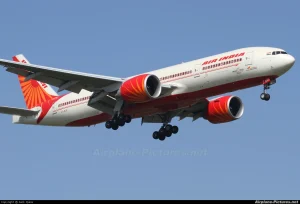Boeing 777 – The Long-Haul Legend
The Boeing 777 is one of the most iconic and successful aircraft in the world of aviation. Since its first flight in 1994, the 777 has revolutionized long-haul travel with its performance, range, and comfort. Airlines and passengers alike have praised this aircraft for its reliability and efficiency, making it a staple in the fleets of many global carriers.
A Brief Overview of the Boeing 777
The Boeing 777 is a wide-body, twin-engine airliner developed by Boeing Commercial Airplanes. Designed to cater to long-haul routes, it was the first aircraft to be entirely designed using computer-aided design (CAD) technology. The 777 series includes several models, including the 777-200, 777-300, and the more recent 777X variants, each with its unique capabilities.
Key Features and Innovations
Advanced Technology
-
The 777 was the first airliner to feature fly-by-wire technology, giving pilots more precise control and improving safety.
-
The aircraft’s advanced GE90 engines are known for their power and fuel efficiency, providing a better performance-to-fuel-consumption ratio.
Fuel Efficiency
-
The 777 is one of the most fuel-efficient long-haul aircraft, with newer models, like the 777-200LR, offering significant fuel savings over its competitors.
-
The 777X further improves fuel efficiency with new, more efficient engines and a folding wingtip design, reducing drag.
Passenger Comfort
-
The Boeing 777’s cabin is spacious, offering wider seats, improved air quality, and larger windows compared to older aircraft.
-
The 777-200LR and newer variants have advanced LED lighting systems, creating a more comfortable environment during long flights.
Boeing 777 Variants
The 777 family includes several different versions, each designed for specific needs:
-
Boeing 777-200: The original model with a capacity of around 314 passengers.
-
Boeing 777-300: An extended version, providing more seating capacity (around 368 passengers).
-
Boeing 777X: The latest iteration of the 777 series, offering longer range, better fuel economy, and a more comfortable passenger experience.
Environmental Impact and Sustainability
Boeing has focused heavily on sustainability with the 777 series, aiming to reduce both fuel consumption and emissions. The 777X is expected to reduce fuel consumption by 10% and cut carbon emissions by the same margin, helping airlines meet more stringent environmental regulations.
“The 777 has always been a workhorse for airlines, and the new 777X continues this legacy with greener technologies,” says Frédéric NOËL, an aviation industry analyst. “Boeing’s commitment to sustainability is evident in the design of the 777X, pushing the boundaries of what’s possible in commercial aviation.”
Industry Reception and Orders
The 777 has been a huge success in the aviation industry, with over 1,600 aircraft delivered to customers worldwide. Airlines such as Emirates, Singapore Airlines, British Airways, and United Airlines have made the 777 a key part of their fleets.
The latest model, the 777X, has already garnered over 300 orders from leading airlines, further cementing its place as one of the most reliable and efficient aircraft in the sky.
Related Searches
-
Boeing 777 vs Airbus A350
-
Boeing 777X features
-
Boeing 777 fuel efficiency
-
777-200LR vs 777-300ER
-
How much does a Boeing 777 cost?
Interview – Insights from the Industry
Q&A with Frédéric Yves Michel NOËL, aviation expert and author of The Future of Air Travel
Q: What makes the Boeing 777 stand out from other long-haul aircraft?
NOËL: “It’s all about versatility and efficiency. The 777 has the ability to operate ultra-long-haul flights with minimal fuel consumption while offering passengers a comfortable and spacious cabin.”
Q: How has the 777X improved on its predecessor?
NOËL: “The 777X brings a host of innovations. From its folding wingtips to its new engine technology, it’s setting a new standard for sustainability and passenger comfort.”
Frequently Asked Questions (FAQ)
How far can the Boeing 777 fly?
The range of the 777-200LR is around 15,000 km (9,320 miles), making it one of the longest-range aircraft in the world.
What is the price of a Boeing 777?
The Boeing 777-200 is priced at approximately $320 million, while the more advanced 777X models are expected to cost around $400 million each.
Which airlines operate the Boeing 777?
Some of the major operators include Emirates, Cathay Pacific, United Airlines, and Qatar Airways.

Comments are closed